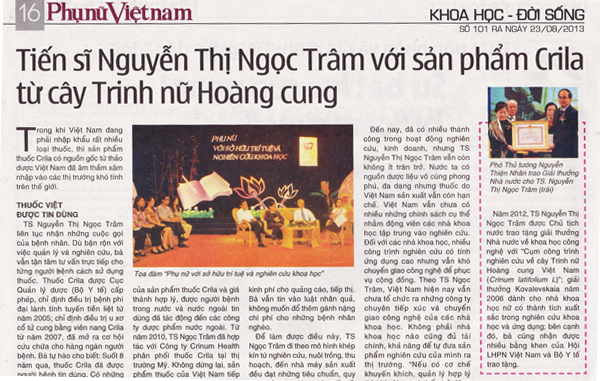While Vietnam has to import many kinds of medicines, Crila product from Vietnamese herbs is penetrating silently into a difficult market in the world.
 Vietnamese medicines are trusted to use
Vietnamese medicines are trusted to use
Dr. Nguyen Thi Ngoc Tram continues to receive patients’ calls. In spite of being busy with management and research, she is still devoted to give instructions to each patients. Crila medicine was allowed for the indication of benign prostatic hyperplasia in 2005 and uterine fibroids in 2007 by Drug Administration, which has opened opportunities to cure thousands of patients. She proudly says ‘Crila medicine has been trusted by patients in the last 8 years’. Some people recovering from uterine fibroids gave birth to a baby and named her Tram to express gratitude to Dr. Tram.
Crila capsule not only is present at home but also reaches out international market. The first consignments penetrating into American market are also simple. Dr. Ngoc Tram shares ‘All product marketing is thanks to patients. Patients use medicine and get good results, then they introduce to close relatives and friends. “Good wine needs no bush”, customers begin to notice and place orders.
Crinum Health distributes Crila medicine in American market. Not stop there, medicine products of Vietnam continue to penetrate into Canadian, Russian, French markets, etc. Bringing patients more pleasure, Dr. Ngoc Tram proudly shared ‘Vietnamese medicines have high quality which keep pace with international products, and trusted to use by many foreign patients’. She added as a scientist with limited financial source, it’s not easy to bring Vietnamese medicine products to international markets. It’s product’s treatment efficacy and reasonable price that win the trust from patients at home and abroad. Since 2010, Dr. Nguyen Thi Ngoc Tram has work in cooperation with this company.
Business philosophy of a scientist
Dr. Ngoc Tram thinks plainly: In any nations, the majority of patients are poor people. Although she works in business field, she still keeps a scientist’s thoughts and emotions: “Don’t lay too much emphasis on profits but tend to people’s livelihood and serve for poor people”.
To have low price, manufacturing process has to be close with maximum savings; avoid more expenses for advertisement and marketing. She still believes in law of cause and effect and she doesn’t want to put more cost burden on poor patients.
To do this, Dr. Ngoc Tram follows closed model from research, cultivation and harvest to factory under national and international standards and regulations. At the same time, products are strictly verified, tested and appraised clinically to fulfill the conditions to be launched in world market.
Dr. Ngoc Tram still remembered announcement days of research work of medicines for benign prostatic hyperplasia from alkaloids extracted from Vietnamese Crinum latifolium L. leaves in 2004. Although this research work has high practicability, there is no business to receive technology transfer. She herself managed to launch her product to market, serving community. At the start, she faced a lot of difficulties. Even she has to put her own land use right certificate in pawn in order to buy equipment and machinery.
So far, having achieved much success in business and research activities, but Dr. Nguyen Thi Ngoc Tram still has much concern. Our nation has plentiful and varied source of pharmaceutical materials but medicines produced in Vietnam are still limited. Vietnam doesn’t offer many specific policies in order to encourage scientists to concentrate on research. As for scientists, many research works have high applicability but it’s difficult to transfer technology in order to serve community. According to Dr. Ngoc Tram, Vietnam doesn’t set up companies specializing in contacting and transferring the technology of scientists. Not all scientists can afford to bring research products to market. Dr. Nguyen Thi Ngoc Tram affirmed ‘If there are incentive mechanism and reasonable management, Vietnam can supply 70% of medicine demand with low price, reducing the burden for millions of patients’.
H. Hòa